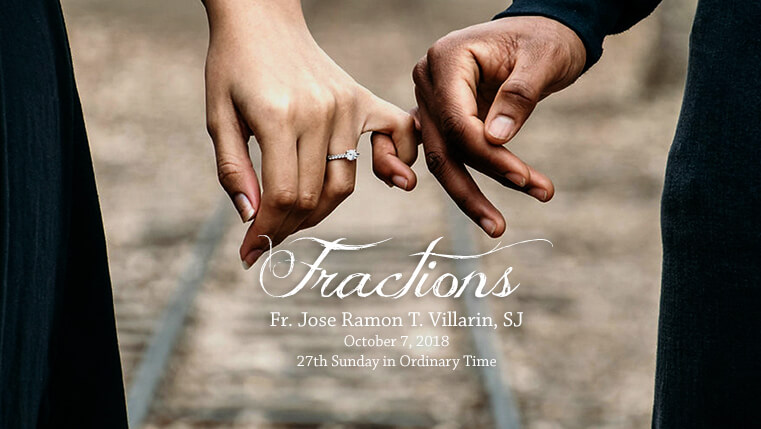


Fr. Jose Ramon T. Villarin, SJ
27th Sunday in Ordinary Time
October 7, 2018
Fractions are not easy to learn. In kindergarten, we begin with adding numbers that are whole like one, two, three. When we learn subtraction, we learn about negatives and that mysterious number zero. Then on to division, and life becomes complicated with fractions.
Like fractions, love is not easy to learn. Every wedding homily is a variation of the same lesson: love one another forever. Priest, easier said than done.
It takes some doing to love, let alone love forever. Loving one another in the morning of our lives is a breeze. Loving that same person till twilight can be fraught with unpredictable gusts and rain from heaven.
And yet every love begins with a dare to ride the seasons and defy death even. It is more than just a rose-tinted intuition, this vow to love each other “till the twelfth of never.” It is more than just wishful thinking, this promise to care for each other “for better, for worse, for richer, for poorer, in sickness and in health,” for keeps. And more than just simple arithmetic, this love that senses how one plus one can equal one.
As Jesus in the Gospel today tells us, in marriage, two people “are no longer two but one flesh.” My mathematical mind can only wrap itself around this equation by admitting that it takes work to make one plus one equal one. It takes time; it takes hope, a patient and creative heart, even tears to make that happen.
It takes fractions. It can happen with ½ + ½ or more likely with 1/3 + 2/3 and all the possible permutations of a fraction of one. Love happens with fractions, never with 1 + 0, never with the whole one and the absent zero.
In other words (minus the counting numbers), love divides when the fractioning is not mutual. Love fades when the “and” vanishes in the give-and-take. Love petrifies when, as Jesus tells us, our hearts harden, when we dig deep into our trenches and fossilize.
Going back to numbers, it helps to have a sense of scale. Even doctors ask us when we are in pain to describe the pain on a scale of one to ten. It might help for lovers to ask themselves where on a scale of zero to one their fractioned selves are to be found.
Of course marriage is more than just a matter of math. A lot of heartache can come from counting one’s give and the other’s take. Chances are we will always be found wanting, always approximate, almost there but not quite.
How then do approximate lovers get marriage to work?
There are the usual time-tested variables: presence, mercy, patience, laughter, dinner, children, prayer, personal space, friends, pets, families, exercise, causes, wine, anniversaries, travel, renewals, courtship 2.0, etc etc etc. There is no magic combination, no single algorithm out there that will make love work. One can apply data science and deep machine learning to recognize patterns but every marriage is unique, and thankfully so.
It might help for every couple to assert and celebrate the uniqueness of their love: their relationship is special and unrepeatable. Their love cannot be measured against some baseline out there.
It also helps to realize that it takes time to make a marriage, just as it takes time to undo it. As with non-linear chaotic things in the universe, falling in love starts small, with tiny perturbations rippling about. Falling out too begins imperceptibly, with subtlety. A couple can then place time on their side if they don’t take time for granted.
Speaking of time, love is also a habit of habits. It is an art. It takes practice and a whole lot of honing of homegrown talent. Of all the habits that can be cultivated, I would put patience right up there on the list. Like gold, patience is tested and shaped in fire.
The veteran lovers in our midst know that love is a choice, a decision, a matter not just of emotion but of the will. And it takes two wills to make that motion of marriage. It takes two wills to defy entropy and the unraveling of one into one minus one.
One last. Love seems to work when lovers learn to pray. Pray to God, yes. Pray to God together, yes. But love also magnifies when lovers learn to pray not just to God but to one another. It is not easy to pray because of pride. It takes humility to ask and beg and entrust oneself to another person.
Fractions are difficult. Life is full of them. And yet we go on living till sunset despite our incomplete lives, despite the specter of love falling and fracturing into irretrievable pieces. We promise to keep on loving because we sense that love is who we are and love is who God is and love is more than just a rose-tinted illusion.
Love one another forever. Priest, easier said than done. And yet, Lover, to paraphrase the poet, ‘tis better to have done and willed and worked at it, than not to have done at all.